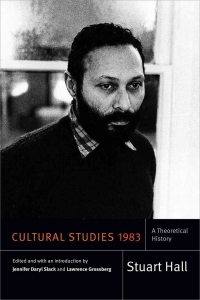Cultural Studies 1983: A Theoretical History offers a posthumous collection of lectures by influential cultural theorist Stuart Hall, given to students at the University of Illinois in 1983, covering such topics as the formation of Cultural Studies as a ‘political project’ and Hall’s theorisation of hegemony. Edited by Jennifer Daryl Slack and Lawrence Grossberg, Hall’s insights feel fresh, galvanising and both timeless and timely, writes Sofia Ropek Hewson, underscoring the importance of long-term political struggle as ‘the work we need to do’ – and positioning Cultural Studies at the heart of this.
Cultural Studies 1983: A Theoretical History. Stuart Hall, edited by Jennifer Daryl Slack and Lawrence Grossberg. Duke University Press. 2016.
 Cultural Studies 1983: A Theoretical History, edited by Jennifer Daryl Slack and Lawrence Grossberg, is a posthumous collection of lectures given by innovative cultural theorist Stuart Hall to students at the University of Illinois in 1983. The collection is inspiring and comprehensive, covering, for example, the birth of Cultural Studies, Marxist structuralism and Hall’s crucial post-Gramscian work on hegemony. And his lectures feel fresh and timely: Hall writes that cultural studies ‘emerged when particular political problems were pressing’, but notes that ‘there are always such moments, confronting people with a major historical shift, a change in the tempo and texture of society’. In such cases, ‘old theories prove themselves inadequate’ and ‘new theories have to be generated’, even if these theories inevitably operate on ‘already occupied theoretical terrain’. Theories may be layered on top of each other, they may share the same discourses, but we still need new ones, particularly in times of significant political change.
Cultural Studies 1983: A Theoretical History, edited by Jennifer Daryl Slack and Lawrence Grossberg, is a posthumous collection of lectures given by innovative cultural theorist Stuart Hall to students at the University of Illinois in 1983. The collection is inspiring and comprehensive, covering, for example, the birth of Cultural Studies, Marxist structuralism and Hall’s crucial post-Gramscian work on hegemony. And his lectures feel fresh and timely: Hall writes that cultural studies ‘emerged when particular political problems were pressing’, but notes that ‘there are always such moments, confronting people with a major historical shift, a change in the tempo and texture of society’. In such cases, ‘old theories prove themselves inadequate’ and ‘new theories have to be generated’, even if these theories inevitably operate on ‘already occupied theoretical terrain’. Theories may be layered on top of each other, they may share the same discourses, but we still need new ones, particularly in times of significant political change.
Hall guides the reader through approaching cultural analysis: ‘one must begin by describing the existing terrain of theoretical discourse […] initially some synthesis has to be made’. Cultural Studies must also be understood in terms of institutionalisation: universities, funding projects and cultural centres shape the discipline. However, he also acknowledges that culture is ‘exceedingly slippery, vague and amorphous’ as a concept, and admits that he feared invitations to events that involved explaining exactly what ‘culture’ meant. Ultimately, for Hall, Cultural Studies involves choosing to ‘work in a displaced field’, and weaving between intersecting disciplines.
Hall’s first lecture on the formation of Cultural Studies crucially defines its birth as a ‘political project’ rather than an ‘intellectual pursuit’: it was a ‘way of analysing postwar advanced capitalist culture’. Hall emphasises the importance of writers like Richard Hoggart, who described the working-class homes in which he was raised, including examining the arrangement of their living rooms. Hoggart attempts to ‘read them’, as Hall writes, in ‘the same way as he would read a piece of prose’. Hall notes that this method was revolutionary, considering that ‘if you began talking to Leavis [a prominent twentieth-century British literary critic] about the front living room of a working class house in Leeds, he wouldn’t know what you were talking about’.
Hall also affirms the importance of Raymond Williams’s contribution to Cultural Studies: ‘culture, for Williams, is inseparable from life as it is lived or experienced’. Hall agrees that culture is fundamentally ‘experience lived, experience interpreted, experience defined’. Culture is the formation of a ‘whole way of life’: thus, cultural analysis is inevitably occupied with identifying patterns, in order to ‘discover shared ideas and forms of communication’.
But Hall notes that theorists like Williams and E.P. Thompson believe that these patterns must refuse to portray their subjects in ‘thin’ terms: ‘if the purpose of cultural theory and analysis is to reconstitute the thick texture of structures of feeling, of lived experiences which constitute the distinctiveness of different groups’, how can abstraction be helpful? Cultural analysis must ‘reaffirm their experiences’ and illustrate their complexities. According to Hall, Cultural Studies inevitably encounters the problem of how to think and write about interwoven cultural practices and people: whether the task is to ‘recuperate and celebrate’, in the humanist tradition or, as in the structuralist paradigm, to ‘account for their weaknesses and failures’.
Hall’s work on dominance and hegemony also feels apt: he writes that ‘dominant cultural forms are able to change and adapt to new circumstances by incorporating residual and emergent forms’, citing the first time that hippies appeared in Time magazine. Hall affirms that dominant cultures are ‘working effectively and in a hegemonic way’ if they decline to destroy resistance movements. Instead, hegemony must make space for resistance and other possibilities and create the appearance of diversity: ‘the sense of the rich open-ended variety of life, of mutual tolerance and respect’. For example, we might recall Donald Trump’s original response to the recent women’s march on Washington DC: ‘Watched protests yesterday but was under the impression that we just had an election! Why didn’t these people vote? Celebs hurt cause badly.’ This tweet was followed two hours later by: ‘Peaceful protests are a hallmark of our democracy. Even if I don’t always agree, I recognize the rights of people to express their views.’ The quick transition from petulance to an acceptance of the right to protest represents the administration asserting its dominance through making space for diverse opinions.
Hall mentions that ‘dominant ideology often responded to opposition not by attempting to stamp it out, but rather by allowing it to exist, by slowly allowing it to be recognized, but only within the terms of a process which deprives it of any real or effective oppositional force’. Hegemony ‘boxes them in partly by the iron fist and partly by the velvet glove. But the fact that those open spaces exist is a testimony to its capacity to rule’. But Hall also adds, later in the lectures, that hegemony is more complex than ‘everyone is incorporated into the existing system’; rather, hegemony gestures to the ‘movement from the coercive to the consensual pole’. For hegemony, victory is about occupying every front, rather than a ‘great battle’ which results in the ‘final collapse of the enemy’.
Notably, then, Hall acknowledges that hegemony is not secured when power is exerted through censorship or repression (which recalls student protests and how eager we were for the university to respond with force or censorship in order to prove its faltering hold on dominance). Crucially, opposition to dominant ideology structures and supports it. Hall also memorably affirms that hegemony ‘needs to insert itself into the pores of the practical consciousness of human beings’. This prefigures the importance of the body (through pharmacology and pornography, for example) in contemporary hegemonic practices, with ‘into the pores’ particularly evoking the increasing miniaturisation of biopower (power over bodies, from Michel Foucault) in the twenty-first century, described by theorists such as Donna Haraway and Paul B. Preciado.
Ultimately, Hall’s collection of lectures is persuasive, galvanising and feels both timeless and timely, despite its posthumous status. The volume deals with the importance of long-term political struggle: ‘rather than reserving the notion of class struggle only for the moment of the barricades, we need to see resistance as the continual practices of working on the cultural domain and opening up cultural possibilities.’ He acknowledges that this is ‘perhaps not the most glamorous political work, but it is the work we need to do’. Political energy directed against the Trump administration and the British government must be sustained, and apathy and exhaustion forestalled: as Hall implored in 1983, Cultural Studies and political protest, which are inextricably intertwined, form ‘the work we need to do’.
Note: This review gives the views of the author, and not the position of the LSE Review of Books blog, or of the London School of Economics.
Image Credit: Contemporary Cultural Studies, Muirhead Tower, University of Birmingham, Birmingham (Diane Griffiths CC BY 2.0).









1 Comments